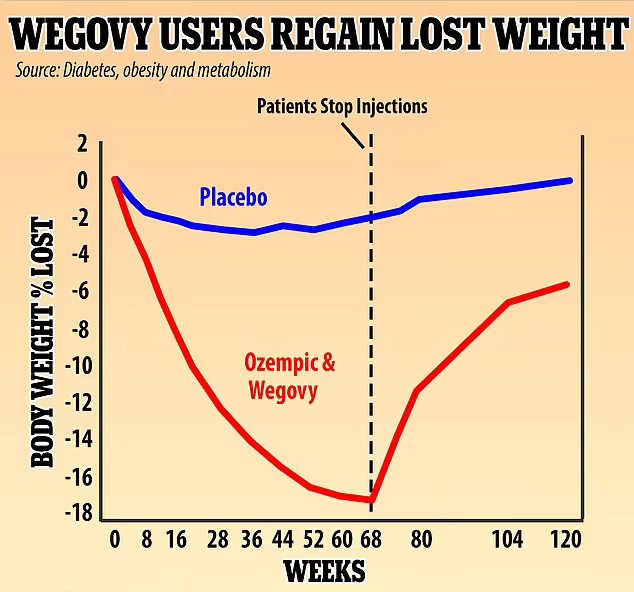Warning: Fatal Side Effect of Wegovy and Ozempic for Weight Loss
Scientists Sound Warning of Possible Fatal Side Effect from Wegovy and Ozempic That Could Have Been Overlooked During Trials
Medical authorities have cautioned that injections such as Wegovy that are intended to induce weight loss may bring about a potentially lethal side effect that was not noted during testing.
GLP-1 Hormone and Intestinal Obstruction
The success of certain pharmaceuticals is based on their ability to replicate the influence of GLP-1, a hormone that decreases the velocity of food traveling through the intestines, resulting in a greater sense of satiety after eating. It is believed by scientists in China that utilizing the drugs could lead to an enlargement of the small intestine, which may result in an obstruction of the digestive tract that could be fatal.
Mice Experiments and Clinical Trials
Mice experiments indicated that after 20 months of being medicated with GLP-1 drugs, their intestines became enlarged. The clinical trials for Wegovy, that cost over $1,000 per month, only extended up to 16 months, so this major side-effect might have gone unnoticed.

Wegovy and Ozempic
The Danish-based company Novo Nordisk has developed Wegovy, a weekly injectable drug, which has been associated with considerable weight loss in the long term. Scientists have warned that those who take drugs such as GLP-1, including Wegovy, may experience an increased size of the intestine, which can lead to blockages due to its reduced flexibility.

Actress Chelsea Handler, 48, has revealed that she is taking Ozempic, and proudly displays her youthful looks while skiing.
Intestinal Obstruction and its Consequences
The researchers mentioned that the constant raising of the intestinal length and villus height due to treatment with this class of drugs could lead to a lack of elasticity in the small intestine, causing a long-term blockage of the upper digestive tract. Untreated intestinal blockages can have immense consequences, including the potential death of the surrounding healthy tissue. The medical condition can impede the flow of blood to an area of the intestine, leading to the death of the tissue in the wall due to insufficient circulation. Those with the condition are also more vulnerable to peritonitis, an infection of the abdomen that can be fatal.

Wegovy and Muscle Loss
Recently, another potential effect has been identified. According to medical professionals, the majority of patients taking the drug experience more muscle loss than body fat loss. Research has revealed that those who discontinue the medication tend to rapidly gain weight in a matter of months.
Popularity of Wegovy and Ozempic
The popularity of Wegovy, Ozempic and other drugs for weight loss has caused worries, but at the same time, it has made them so popular that it resulted in a shortage of supply for the majority of last year. Novo Nordisk, its producer, has stated that the supply issues will be resolved in a few weeks as they are ramping up the supply.
Studies and Findings
The research group from China presented their results last month in Acta Pharmaceutica Sinica B, a respected pharmacology journal in China. The team called attention to the outcomes of earlier studies which established a relationship between the drugs and stomach problems. At the conclusion of 2020, a French research group published their findings based on data from VigiBase, the World Health Organization's database for tracking global adverse drug reactions.
French Study Finds Increased Risk of Intestinal Blockage in GLP-1 Medications Users
At the conclusion of 2020, a French research group published their findings based on data from VigiBase, the World Health Organization's database for tracking global adverse drug reactions. By examining over 500,000 case studies, researchers noticed that individuals taking GLP-1 medications for diabetes control were at a 4.5 times greater risk of intestinal blockage.
GLP-1 Medication Ozempic Already Released in 2017, While Wegovy Was Released Worldwide in 2021
It was not until 2021 that Wegovy was made available worldwide, following the completion of this study; however, its sister drug, Ozempic, containing the same active ingredient, had already been released in 2017.
Decrease in Muscle Mass Observed in Wegovy Users
According to medical and exercise professionals, Wegovy has been observed to cause a decrease in muscle mass for users.
British Study Confirms Increased Risk of Intestinal Blockage in GLP-1 Medication Users
In the year 2022, British scholars conducted a study where they evaluated the rate of intestinal blockages between two groups of diabetes drug users: 25,617 GLP-1 users, and 67,261 of a different type. The findings were published in the journal Clinical Pharmacology & Therapeutics. It was discovered that individuals taking GLP-1 had a 3.5 times greater chance of intestinal blockage.
Connection Between GLP-1 and Stomach Troubles Observed
It was observed in both studies that there was a connection between the utilization of GLP-1 and stomach troubles; however, it could not be confirmed that they were directly linked. Diabetes may manifest as intestinal obstruction, and the research could be providing evidence of this at an expansive body level.
Possible Consequence of Medication
Dr. Shauna Levy, an obesity medicine specialist at Tulane University who was uninvolved in the most recent study, shared that it is hard to determine if the obstruction is a consequence of the medication. When evaluating a patient, medical professionals should reflect on the individual's past experience with bowel obstruction prior to prescribing this medication.
Dispensing of Medication
It is essential to note that GLP-1 RA are medications that should be dispensed by a healthcare provider who can examine the patient beforehand to determine if they have any preconditions that would be against taking the medication.
Research Findings
A research project in 2022 conducted by scientists around the world, including those from the University of Alabama, Birmingham and the University of Pennsylvania, was mentioned by her. This study monitored the use of semaglutide for a period of two years and found that there was no heightened risk of intestinal obstruction associated with adults taking this medication.
Possible Risks and Further Study
The agreement was given by Dr Christopher McGowan, a weight loss expert from North Carolina.'It may be hard to apply these discoveries to come to any conclusion regarding the effects on humans, although this chat might raise some doubts.' Clinical studies involving GLP1 medications may only last for less than two years, yet these drugs have been studied and used for more than 10 years, which can bring some comfort. Even though GLP1 medications, like semaglutide, are now being used by a very large number of people to lose weight again, there is a need to be vigilant and report any unusual side effects. As these treatments are meant to be taken for a prolonged period of time, there is still much to be discovered concerning the possible risks that may arise after several years of taking them.

Animal Studies to Support Argument
The Chinese team, however, relies on studies conducted on mice to support their argument. In a 2007 study conducted by Danish researchers, it was discovered that the small intestines of rodents that had been exposed to drugs had grown nine percent in length and 31 percent in width. Source: American Journal of Physiology - Gastrointestinal and Liver Physiology.
- Choosing a selection results in a full page refresh.
- Press the space key then arrow keys to make a selection.

